Planning a trip to the United States? Then make sure you don’t forget your travel insurance! Read on for the best travel insurance for budget travelers, backpackers, active trips, and more… Plus, we show 2 possible options for FREE travel insurance that you might not have heard of!

A trip to the United States can be great. But it can also be stressful!
You have to figure out your plane tickets, book your hotels, schedule your activities, plan your itinerary, perhaps prepare yourself for some jet lag…
And out of everything you have to deal with before your trip to the United States, there’s one important detail that many travelers forget: getting their travel insurance.
If that sounds like you, don’t worry! Just read on for all you need to know about buying travel insurance for the United States (including a list of the best and cheapest travel insurance options!).
But first…
Do I really need travel insurance for a trip to the United States?

In short, yes!
Good travel insurance is really important, especially if you travel like I do and do activities where the chance of getting hurt (and having to deal with the subsequent medical expense!) is high.
Because during my trips, I’m always hiking on mountains, climbing things, jumping here, throwing myself over there, swimming where I shouldn’t, diving ….basically doing everything that I consider part of a perfect trip!
Imagine you’re snowboarding in Switzerland without travel insurance, get hurt in the middle of the mountain, and have to be evacuated by helicopter. The medical bill you will receive, while still in the hospital bed, will have so many zeros that you’ll have to stay longer at the hospital to treat your cardiac arrest!
And really, getting travel insurance is a good idea no matter where you’re going.
After all, I’ve lost count of how many backpackers I met during my travels with the famous “Thai Tattoo” – AKA a giant scar on their legs from burning themselves on the exhaust pipe of a scooter in Thailand!
And do you really want to go to a public hospital in the middle of Bangkok?!?! With travel insurance, you can go to a private hospital where they will probably l take much better care of you.
But do I actually need travel insurance? I don’t usually do any extreme activities or sports!
Here’s the deal: even if you’re just going on a shopping trip to Miami, you’re going to want travel insurance.
Even if health insurance isn’t mandatory in the United States like in some other countries, there’s always some level of risk when traveling. Whether tripping while walking in the street, getting hit in the head, or simply getting sick.
And using the American health system (and many others) without any kind of insurance is like asking for personal bankruptcy.
Plus, there are many countries that require you to have some form of health or travel insurance to enter the country, United States included.
And remember, travel insurance won’t just cover you for health or medical problems. Depending on the plan you may have, it can help pay for lost luggage, flight delays, bad weather, and even your evacuation from a country if civil unrest breaks out.
Update regarding travel insurance and the coronavirus (COVID-19)
We all know Covid isn’t totally gone for good. So you may be asking yourself if your travel insurance will cover you if you get sick.
By this point, just about every travel insurance plan out there will cover sickness from covid-19. However, I recommend double-checking your policy for specifics before you buy.
(Or for more details, you can also take a look at our article here: Does International Health and Travel Insurance cover Coronavirus (COVID-19)?)
Observation: these are travel insurance options designed for tourists. If you are going to the United States to study, then you need an international health insurance plan for international students. If you are going the the US as a worker or immigrant, then you need a health insurance policy for expatriates. You can see some options for this at the bottom of the article here.
How does the health system in the United States work?
Unlike other developed countries, the U.S. doesn’t have universal healthcare. Instead, it relies heavily on private insurance options.
Millions of Americans are uninsured or underinsured, and healthcare costs in the US can be crazy expensive.
Although the quality of the care might be great… to give you an idea, medical bills are the #1 cause of bankruptcy in the United States!
In other words, it’s definitely a country you want to make sure you have travel insurance in.
What are the best travel insurance options for a trip to the United States?
If you research travel insurance online, you’ll find tons of options.
But over the years, I’ve done a LOT of research on travel insurance companies (as well as tried a whole bunch of them myself!). And the list below includes the travel insurance options I always end up coming back to.
Though do keep in mind that your final options will depend on where you’re from and how much/what kind of coverage you want for your trip.
I recommend taking some time to get a quote from each of these companies for your trip. I know it can take a bit of time. But the money you can save at the end of the day makes it worth it!!
Travel insurance aggregator websites that let you compare and buy different plans
1. The well-known, mid-priced travel insurance company:
IMG Global (accepts citizens from most countries!)

IMG, or International Medical Group, is a well-known American insurance company that offers travel insurance to travelers from more than 190 countries.
In other words, no matter where you’re from, it’s a great option to look into for travel insurance for your trip to the United States!
They have one travel insurance plan available for Americans only (Patriot Travel Medical Insurance) and one available for non-American travelers (Patriot America Plus).
You have the option to select your desired level of coverage ranging from US$50,000 to US$500,000, and deductibles ranging from US$0 to US$2,500.
Their prices are generally competitive. But like some of the other options on this list, there are some activities they don’t cover. So I recommend reading your policy closely to make sure it includes everything you need before you buy.
Travel insurance for seniors (65+): one thing that makes IMG unique is that they offer a travel insurance plan specifically tailored to travelers aged 65 and over, called GlobeHopper Senior.
IMGlobal travel insurance and COVID-19 coverage
In most cases, all IMG plans will cover any Covid-19 care you might need, including treatment, hospitalizations, or even medical evacuations. Just make sure to read your policy closely before buying to see if there have been any changes.
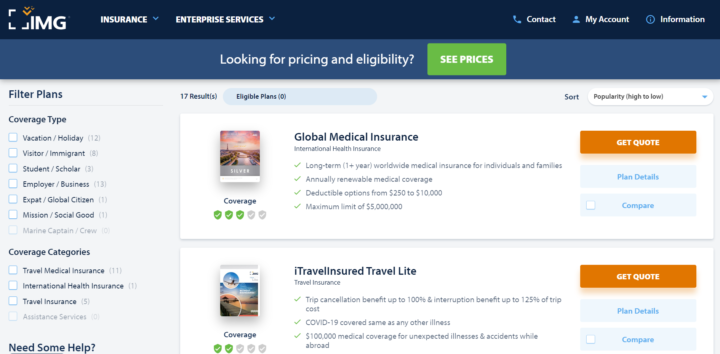
2. The best, most comprehensive travel insurance company for backpackers and adventurous travelers:

(5% discount coupon comfort5)
I truly believe that World Nomads is the best backpacker travel insurance company out there.
Any time I’m traveling in an area where I have some adventures or more “risky” activities planned (snowboarding, canyoning, hiking, glacier walking, skydiving, deep-water diving, skiing, climbing, etc.), I make sure to get a policy with World Nomads.
They really do cover just about everything. And I’ve yet to find another company that offers a better deal for ALL the activities that World Nomad policies cover. (But if you have, please do let me know in the comments area below!)
If you have a particular activity in mind and want to know if it’ll be covered by World Nomads or not, you can take a look at this page here.
Essentially, there are two types of policies with World Nomads that you can choose from. The first is the “Standard” policy. Even if you have some adventurous activities planned, the “Standard” option may still be plenty as it’ll still give you emergency medical coverage for activities like downhill skiing or hiking up to 6,000 meters (nearly 20,000 feet)!
Otherwise, you also have the “Explorer” plan, which is perfect for more extreme travelers. This plan will cover just about any other activity imaginable. (Though obviously make sure to double-check your plan before you buy if you have something specific in mind that you want to have covered.)
Another cool feature from World Nomads is that you can add optional coverage for “high-value specified items such as iPhones and digital cameras.” If you’re traveling with a lot of electronic gear or traveling in areas where theft is common (like my native country of Brazil, for example), then this can be a smart add-on.
I can also add that, at least based on my personal experience seeking reimbursement after getting sick in Thailand, their customer service team is very attentive and easy to deal with.
One more thing to know: with World Nomads, you can buy your travel insurance even if you’ve already begun your trip. You don’t have to be in your home country of residence to buy or extend a policy.
You can get a 5% discount code on your World Nomads travel insurance policy by using the coupon code “comfort5″.
(P.S. If you’re anything like me and are also addicted to sports and adventure activities and want to make sure you have good travel insurance that covers them, here are two other articles you might like: 3 Best International Travel Insurance for Extreme Sports and Adventure Activities and 9 Tips to Stay in Shape During Your Travels.)
WorldNomads travel insurance and coronavirus coverage
As of writing this article, World Nomads doesn’t explicitly address whether or not their insurance plans cover Covid-19 treatment. However, you can find their most up-to-date position on the coronavirus on their website here.
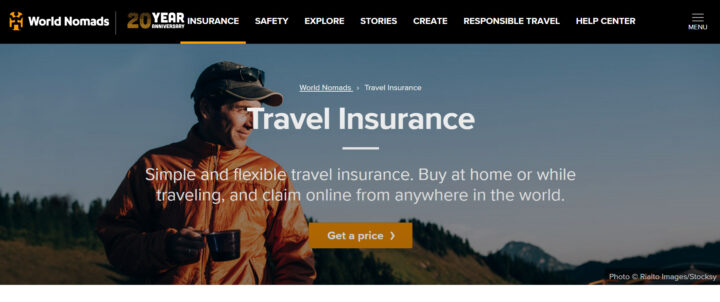
3. One of the cheapest travel insurance companies you’ll find anywhere:
WorldTrips (formerly Atlas Travel)

In my experience, travel insurance plans from WorldTrips tend to be some of the cheapest on the market. But just keep in mind that, most likely due to the price, they might not cover as many things as a company like World Nomads might!
Because of this, I like to use WorldTrips when I’m traveling to a “safe” place where I plan to mostly be visiting cities, like the United States or Europe.
Although I’ve purchased travel insurance plans from WorldTrips before, I’ve luckily never had to ask for reimbursement. So I’m not honestly sure how smooth their reimbursement process is.
But I did find some reviews from others who did and had things work out. So, it definitely seems like WorldTrips is a great option for anyone traveling on a tight budget and looking for cheap travel insurance.
In general, WorldTrips accepts citizens from all over the world, though there are a few exceptions. You can find plans of all lengths and types, ranging from a 1-year round-the-world backpacking trip to a short study abroad trip for a university student.
One nice thing about WorldTrips is that you can buy your policy even if you’ve already started your trip. It’s no problem if you’re already overseas and want to buy or extend a plan.
Finally, unlike many other insurance companies, there is NO age limit for WorldTrips! Naturally, the price of the plan will increase as the age increases. And when you’re over 70 and then 80, the coverage limits decrease.
So yes, you will pay more than a younger person for the same amount of coverage.
However, few travel insurance companies cover seniors at all, so WorldTrips really is a solid choice for senior travel insurance!
WorldTrips travel insurance and Covid-19 coverage
In most cases, any medical expenses incurred by Covid-19 sickness will be covered by your WorldTrips policy. However, make sure to double-check the details of your policy before you buy for up-to-date coverage.
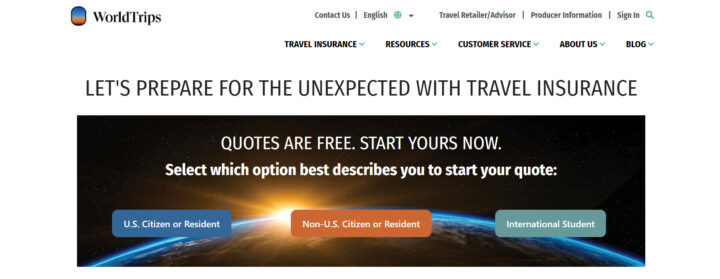
4. The new international travel insurance company for digital nomads and adventure/extreme sports:

Traveling to the United States? Medical expenses in the U.S. can be sky-high, making a good travel insurance essential. SafetyWing offers flexible and affordable plans to ensure you’re protected during your trip.
SafetyWing has earned quite the name for itself in the world of insurance with its variety of travel insurance options for students, digital nomads, expats, and, of course, travelers in general.
One thing that makes SafetyWing stand out is its focus on insurance plans that cover adventure sports and extreme activities. (Like WorldNomads!)
Why SafetyWing’s Nomad Insurance Essential plan works for U.S. travelers:
- Medical coverage: Includes hospital visits, urgent care, and evacuation – must-haves for travelers in the U.S.
- Emergency evacuation: Provides repatriation coverage in extreme situations, giving you peace of mind.
- Simple and user-friendly: From sign-up to managing your policy, the process is straightforward, thanks to their intuitive website.
- 24/7 support: Access customer assistance anytime, no matter where you are.
What to Keep in Mind:
- Higher premiums in the U.S.: Coverage in the U.S. is more expensive due to the country’s healthcare costs.
- Price visibility: The final policy cost, including all fees, requires logging into the platform.
So, for a short trip to the U.S., the Nomad Insurance Essential plan provides solid coverage without overcomplicating things.
SafetyWing travel insurance and Covid-19 coverage
In most cases, any medical expenses incurred by Covid-19 sickness will be covered by your SafetyWing policy. However, make sure to double-check the details of your policy before you buy for up-to-date coverage.
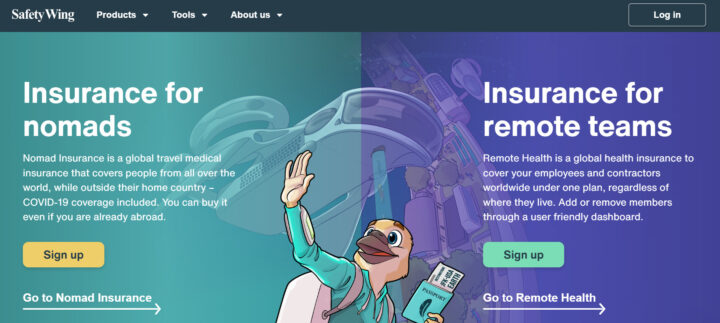
5. The best place to find & compare cheap travel insurance policies:
![]()
Unlike the other options on this list, VisitorsCoverage isn’t an insurance company itself. Rather, it’s a platform that lets you see and compare travel insurance plans from many different companies at once.
It’s a bit like Momondo, which lets you compare plane tickets from different companies. Or Rentalcar.com, which does the same rental cars.
In other words, it makes it much easier to see all your options for travel insurance plans. And then ultimately compare, choose, and buy the best option for your trip.
On VisitorsCoverage, you’ll find everything from business travel insurance plans to student insurance plans.
The website has been around for 10 years, and they cover citizens from more than 175 countries. And, at least based on the reviews, they seem to have pretty solid customer service which is available online 7 days a week.
VisitorsCoverage travel insurance and COVID-19 coverage
On the VisitorsCoverage platform, you can see what each specific plan in your search has to say about Covid-19 coverage. But as with most of the companies I mentioned above, these days most travel insurance plans will include some type of Covid-19 coverage.
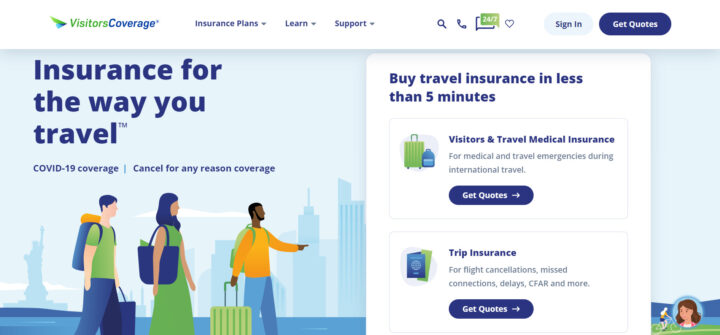
6. Another great website to search for and compare cheap travel insurance policies:

Like VisitorsCoverage, TravelInsurance.com is another travel insurance “portal” that lets you see and compare travel insurance plans from many different companies at once.
To do a search, just type in your personal information and some details about your trip. From there, the platform will give you a comparison of the plans available to you, which you can filter by rating and by price.
One nice feature of TravelInsurance.com is that, beyond travel insurance, they also offer insurance plans for immigrants, international students, and expatriates.
TravelInsurance.com and coronavirus coverage
During your TravelInsurance.com search, you can see what each partner insurer has to say about Covid-19 coverage. But as with most of the companies I mentioned above, these days most travel insurance plans will include some type of Covid-19 coverage.
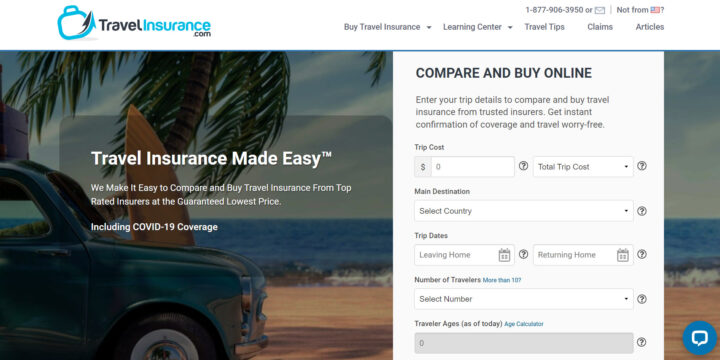
7. A final “travel insurance portal” option to search for and compare policies to find the best deal:

AARDY is one last travel insurance “aggregator” that you can use to see travel insurance plan options from many different companies at once. As they describe themselves, they are the “Amazon” of travel insurance.
One thing that makes AARDY stand out is its great customer service. (Which, as you can see from TrustPilot, scores very highly!)
Beyond their easy-to-use search portal (which lets you quickly and easily compare plans), you can also reach out to them anytime via email, support, or live chat. This way, you can get all your questions and concerns handled before you buy your insurance policy.
One last thing to know: AARDY donates 10% of its annual income to The Special Operations Warrior Foundation, which provides financial assistance to the children of military personnel killed in combat.
AARDY travel insurance and COVID-19 coverage
Since AARDY itself isn’t a travel insurance provider and is only a portal that lets you compare insurance from many companies, you’ll have to look into the individual insurance company before you buy your plan to see what their position is on Covid-19 coverage.
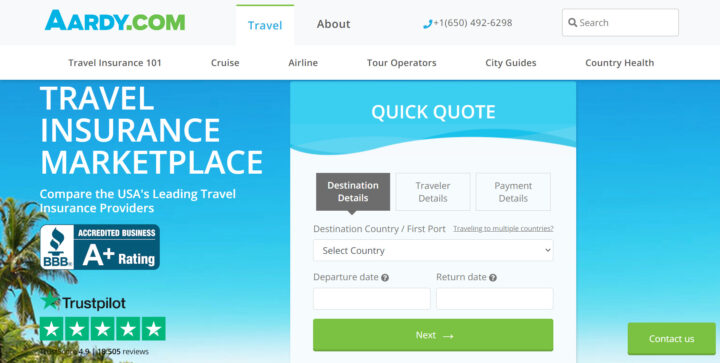
Bonus option to find and compare many different travel insurance plans at once:

Like the other travel insurance “portals” or “aggregators” I’ve mentioned above, InsureMyTrip gives you an easy and quick way to compare travel insurance plans from many different companies at once.
It’s a lot like Momondo, which is an aggregator for airline tickets, or Rentalcar.com, which is an aggregator for car rentals.
One thing that makes InsureMyTrip different is its commitment to quality. If a plan or insurance company receives less than 4 stars, it’ll be removed from their website.
InsureMyTrip is strictly focused on travel insurance. So unlike some of the other options on today’s list, you won’t find any insurance plans for expats, immigrants, or international students here.
But if you’re looking for a plan like this to complement your travel insurance, check out my article on the 5 Best & Cheapest Health Insurances for International Students or 5 Best International Health Insurances for Expats & Immigrants.
InsureMyTrip travel insurance and Covid-19 coverage
Since InsureMyTrip itself isn’t a travel insurance provider and is only an aggregator that lets you compare insurance from many companies, you’ll have to look into the individual insurance company before you buy your plan to see what their position is on Covid-19 coverage.
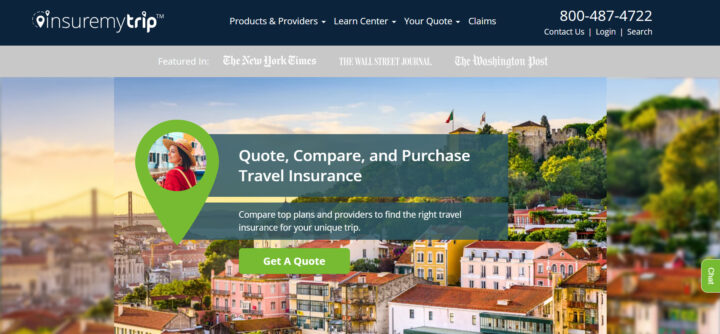
But wait….you might not even need to buy travel insurance!
Here are two sneaky ways you might be able to get “free” travel insurance 🙂
1. Buy your return flight ticket with a credit card to (maybe) get free insurance for your trip.

Depending on what type of credit card you have, if you buy the roundtrip flight with said card, you might have a free basic travel insurance plan included in your purchase.
Visa, Mastercard, American Express, and Diners all have cards that might include this. However, you’ll have to reach out to your card provider or check their website to see whether or not your card has this benefit and how it works.
If you’re traveling to Europe (which I know you aren’t, since you’re reading this article about traveling to the United States…but this is good to keep in mind for the future!) this free basic insurance plan will be enough to cover your mandatory Schengen insurance.
But here’s an important thing to keep in mind: the plan your card gives you will be more of an international health insurance plan, rather than a travel insurance plan.
This means two things. The first is that they’ll likely only cover emergency medical care (and they also won’t cover treatment needed from most sports or any types of “risky” activities).
And the second is that, unlike normal travel insurance, you won’t be covered or be able to receive payment if you have any travel delays, lost baggage, canceled flights, or any other trip-related problem.
Also keep in mind that this won’t work if you’re using miles to buy your plane ticket.* And that the maximum time limit on insurance from these types of credit cards is only 31 days. So if you’re still traveling, you’ll have to buy a regular travel insurance policy to keep yourself covered.
*CORRECTION: According to blog reader Alex, who commented on the Portuguese version of this article, if you have a Visa Platinum credit card and use the miles that you acquired by having this card (and then pay the ticket taxes and fees with this same card), you’ll be entitled to their worldwide travel insurance.
However, I recommend you confirm this information yourself with your credit card provider since the same credit cards often have different benefits based on the countries that they are issued in. Thanks for the info, Alex!
And thanks to a comment by reader Ana Luisa, I learned that the Visa Platinum insurance is normally valid for 60 days, rather than just 30 like most other credit cards. But if your trip is longer than that, make sure you complement the rest of your trip by buying a normal travel insurance policy. But at least you can save some money in those first 2 months 🙂
2. Use your health insurance policy from your home country or country of residence.
Before we go, I have one last potential option for you. And that is to check in with your health insurance plan provider in your home country and see if they offer any international travel insurance options.
Since you are already insured with them, you can often get cheap (or even free!) coverage overseas. Just make sure to verify that their insurance will cover the destinations you’ll be traveling to as well as all of the activities you plan to do.
A quick note about travel insurance for cruising:
Someone recently reached out asking if any of these travel insurance plans could be used for cruise trips, so I did some research.
And based on what I could find, both WorldNomads and WorldTrips will cover you on a cruise.
Worldtrips confirmed with me by email that their Atlas plan will even cover medical evacuation from the ship if needed, depending on the situation.
It appears that all travel insurance plans with WorldNomads will cover cruisers. But remember there is an age limit of 66! For WorldTrips, there is no age limit!
I have yet to receive confirmation from the other companies.
Fraud Warning! As I wrote above, both WorldNomads and WorldTrips can be purchased AFTER you’ve started your trip. But if you do this, be careful about possible fraud!
This does NOT mean you can travel without travel insurance and then purchase a policy only after you’ve gotten ill or had an accident for coverage.
Insurance companies know that this is the type of trick people would try, so most companies have an “anti-fraud” clause. With this clause, you can only use your insurance policy 48 hours after you’ve purchased it.
In other words, if you get very sick during your trip and want to buy travel insurance right then to be covered for your treatment…you’d then have to wait 48 hours until you’d actually be able to go to the hospital or doctor in order to qualify for reimbursement from insurance. Plus, you’d also have to prove to your insurance provider that you only became ill AFTER you purchased your policy.
If you’ve had an accident, you can use your insurance within this 48-hour window. But you’ll be able to prove that your accident happened AFTER you purchased your plan.
In other words, if you have a car or motorcycle accident, you can’t get hurt or injured, by an insurance policy, and then get treatment 48 hours later in order to have it covered by your insurance. Insurance companies aren’t stupid. If they see that someone has purchased a travel insurance plan and then tried to use it very soon afterward (even if the first 48 hours have passed), they will definitely investigate the situation to make sure the person is not trying to trick them.
Can I use traveling insurance while living abroad as an expat or an immigrant?
If you’re living overseas or traveling in a country for a short period, you might be okay with just travel insurance.
But you’re looking for more complete coverage (travel insurance usually just covers medical emergencies), if you’re going to be living abroad long-term, or if you need proof of health insurance for immigration purposes, then what you actually need is an international health insurance plan for expats or immigrants.
If you’d like to learn more about the differences between travel insurance and international health insurance, then you can take a look at our article about the 3 Best International Health Insurance for Expats & Immigrants.
Or, you can quote directly with some of these expat insurance companies here:
Can I use travel insurance during my international exchange or while studying abroad?
In short, it depends! I recommend checking with your school or university first. But normally, if your course or program is less than 3 months and you’ll be studying on just a tourist visa, then a travel insurance policy is enough.
However, if you’ll be needing a student visa, then you’re going to need a health insurance plan that’s designed just for international students or exchanges.
This is especially true if you’re going to the United States with a J1, J2, or F1 visa….or to Europe with a Schengen student visa.
If you’re an international student and think you might need one of these special medical insurance plans, then take a look at my page with The 3 Best and Cheapest Health Insurances for International Students & Exchanges to learn more.
Again, you can check out directly some of these international student insurance companies here:
Cigna for International Students
International travel insurance coverage for terrorism
I’ve had a few comments in both the English and the Portuguese article asking if travel insurance covers acts of terrorism.
I did a bit of research, and here’s what I found out:
Although WorldTrip’s basic travel insurance plan doesn’t cover terrorism, their Atlas Premium plan DOES cover “treatment of injuries and illnesses relating from an act of terrorism, up to the limit set forth in the schedule of benefits and limits.” So yes, they do appear to have terrorism coverage.
Which means if you are traveling and have the incredibly bad luck of getting hurt in a terrorist event, you should be covered if you have WorldTrip’s Atlas Premium plan.
Not to mention, most of WorldTrip’s plans will have a “Crisis Response Cover” included, which will give you protection in case of civil or political unrest, natural disasters, or other crises travelers might encounter abroad. It even includes “express kidnapping” type of crises since it covers response expenses, ransom, and personal belongings surrendered.
However, some countries are not covered by this “Crisis Response” feature, including Iraq, Afghanistan, Pakistan, Nigeria, Somalia, Venezuela, Iran, Cuba, Sudan, and North Korea (although in most of these countries, your regular travel insurance is still valid….just not the “crisis” part of the coverage).
General tips to help you get back your travel insurance reimbursement
All of the travel insurance companies I recommended above have a large provider network of hospitals, clinics, and doctors. The best-case scenario is that you seek out treatment at one of these in-network providers.
This way, you won’t have to pay a dime because the treatment bill will go straight to the insurer. (Unless the treatment happens to be more expensive than the maximum amount of your coverage, that is.)
For this reason, if anything happens (you get sick, suffer an accident, etc.), it’s always best to call your travel insurance ASAP so they can tell you which in-network doctor or hospital to go to seek treatment.
Alternatively, if you’re not able to get to an in-network medical provider, then you’ll have to pay for the treatment out-of-pocket and then ask the insurance company for reimbursement afterward.
But you know how it is.
Insurance companies – whether for cars, homes, health, or travel in general – can be a pain to get payment from. And won’t give you your money unless all the documentation is juuuust right.
In which case, here’s a list of all the documents that travel insurance companies usually ask for when you file a claim to receive reimbursement for medical expenses incurred during your trip.
But first, a few insurance terms to cover:
*make a claim: ask an insurance company for reimbursement for medical expenses
*insurer: the travel insurance company
*beneficiary = claimant = the insured: the person (you) who is asking the insurance company for money/reimbursement
List of documents usually requested by travel insurance policies when you seek reimbursement for medical expenses (if you were treated by an out-of-network provider):
- Copy of the claimant’s national ID (driver’s license or other state-issued ID)
- Copy of Proof of Residency (any current proof – from the last 3 months – with the name of the claimant). If you don’t have this, send a declaration of residence that is completed, signed, and notarized by the insurer.
- For minors, a declaration of residence must be completed, signed, and notarized by the respective legal guardian (form provided by the insurer)
- Copy of the claimant’s voucher
- Original registration information form, signed by the beneficiary (form provided by the insurer)
- Copy of passport (ID page + page with entrance and exit stamps from the country where the accident happened) or other documentation that shows beneficiary was outside of habitual domicile when an accident happened (aka your home country) – for example: airplane tickets (by the way, you should always keep your boarding pass until the end of your trip, not only for filing a possible claim but also request your miles!)
- Presentation of the original medical report with descriptions of the procedures, provided by the health professional or medical center with a clear indication of the diagnosis, clinical history, and admission form, in the case of hospitalization
- Original prescription (if the pharmacy still has the prescription, send your x-ray or a document showing you picked up your medicine in exchange for the prescription)
- Invoice of the medical procedures or the pharmacy receipt with medications prescribed, which should match the quality and quantity of the provided prescription
- Report of medical care (explaining the reason, what happened and how the treatment went – both from the travel insurance staff as well the health providers), written by the beneficiary
- A completed list of expenses (form provided by the insurer)
- Your contact phone number, address, and e-mail
- Proof of bank info (copy of bank statement header, check, or debit card)
And worst of all? You’ll probably have to send all of these documents physically by mail!
Yeah, I know. It’s a huge pain. So it really is much easier if you’re able to seek treatment from a medical provider that’s inside your insurance company’s network. This way, you can skip all the wasted time and headaches preparing this paperwork.
Though if you really don’t have any alternative, going through this reimbursement process isn’t the end of the world.
With a bit of organization and making sure you have all these documents in order, your chances of successfully filing your claim and getting your reimbursement back quickly are pretty solid!
If you’ve ever had to make a claim, let us know your experience and tips in the comments area below to help other readers.
To summarize, these as the best travel insurance companies for the United States:
- IMGlobal
- World Nomads Travel Insurance
- WorldTrips
- SafetyWing
- VisitorsCoverage
- TravelInsurance.com
- AARDY
- InsureMyTrip
My final advice: Seriously, buy travel insurance before your trip! Or if you forgot and are already traveling, buy it ASAP! Or if you’ve already purchased a policy and need to extend your policy (which both WorldNomads and WorldTrips will let you do), make sure you do so before your policy expires!
This way, you have the peace of mind of knowing you’re covered for your entire trip to the United States.
Now, it’s your turn. What has been your experience with travel insurance? Have you ever had to use your policy? What company did you use and how was the reimbursement process? Or did you still have any questions about travel insurance in general?
Let me know in the comments area below, and I’ll get back to you!
Happy travels! (And here’s to hoping you never actually need to use that travel insurance plan you just bought!)







